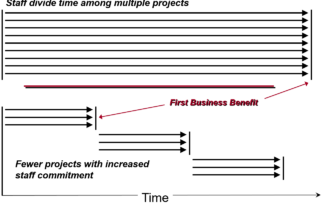Sometimes, insight arrives a couple of decades later.
I’m referring to George Will and his recent column, “Think you’re living in a ‘hellhole’ today? Try being a billionaire in 1916.” (Washington Post, 5/5/2017) and research he cites from economist Don Boudreaux, who makes points identical to those made here more than twenty years ago (“A holiday card to the industry,” InfoWorld, 12/16/1996).
Beyond my chronic whining about how little I’m appreciated by folks like this is a point about human psychology that has broad applicability in your dealings with everyone you work with in the humdrum world of business. Namely, luxury is comparative, not absolute.
To understand the point, look inward: Given a choice, would you prefer to live John D. Rockefeller’s 1916 lifestyle as Boudreaux describes it, or your own? Even, better, ask the question inside out: Given how much better your life is today than his was back then in so many different ways, why is this even a hard decision?
It’s a hard decision because as Rockefeller, you (or I; I’m hardly immune from the syndrome) would have been the envy of everyone else, while today you’re just another schmuck.
Luxury is comparative, not absolute.
How can you use this insight?
Start with program governance. It’s well established that, as the figure shows, when projects are fewer and fully staffed, they all complete earlier than any project does when project staff are spread thin. Businesses that schedule projects this way receive, not just their first benefits, but all benefits earlier than those that rely on multitasking so as to make progress on more fronts all at once.
Everyone benefits. Even business managers whose pet projects launch last get their benefits earlier than they would if everyone’s projects had been approved to launch at the same time.
And yet, this style of project governance is, in my experience, extraordinarily rare. Why? It’s the Ursine Comparative Velocity Strategy in action: I don’t have to outrun the bear, just you, which is to say, I don’t care if everyone does better. I care that compared to everyone else, I’m not last in line.
Luxury is comparative, not absolute, so if you have any influence over your company’s project governance practices, this insight is the starting point for making them more effective.
Example #2: Much to everyone’s astonishment, Microsoft’s Surface Pro line of detachable computers has, according to my informal surveys, become the top I-don’t-care-if-I-need-it-I-want-it end-user device in corporate America. (In case you’re curious, at the bottom of the list are virtual desktops, where the not-personal computer in front of you only provides the keyboard, mouse, and monitor, with everything else happening on a server in the data center.)
If you’re responsible for end-user provisioning, you’d best remember the point about luxury being comparative: If I hold a high-clout position in the enterprise and I want a Surface Pro, you’d best give me a Surface Book, which I’ve never heard of but which is the Bentley to the Surface Pro’s BMW, which in turn is more luxurious than the MacBook’s Lexus, let alone the virtual desktop’s Dodge Neon.
What’s best for the corporation? What do different types of user actually need to get their jobs done? This only matters for those whose positions don’t entitle them to luxury.
Then there’s the ever-popular help desk. In many enterprises executive perks are part of the landscape — executives expect luxury and you’re in trouble if they don’t get it from you if you’re in a position to deliver it.
CIOs in companies where this is part of executive culture know to include an AEE (automated executive escalation) function in their help desk ACDs. The AEE routes calls from known executive telephone numbers to the most senior analyst available, or, failing that, jumps their call to the front of the ACD queue.
Further, help desk analysis are instructed to always ask AEE callers if they’d like an in-person visit to resolve their issue.
If one of these executives asks the CIO if this is standard operating procedure for the help desk, the CIO explains that it isn’t, but that a small list of executives receives “white glove” treatment because, given their role, downtime has a higher impact than it would for most employees.
Does it really? That doesn’t matter. Telling the exec she’s among the exclusive few — that’s what matters.
And it will matter even more come budget season, when the CIO needs executive support for the proposed IT budget.
* * *
On an entirely different subject, my daughter and webmaster Kimberly Lewis recently posted a nice piece on the business value of 508 compliance. Worth your time. You’ll find it here.
